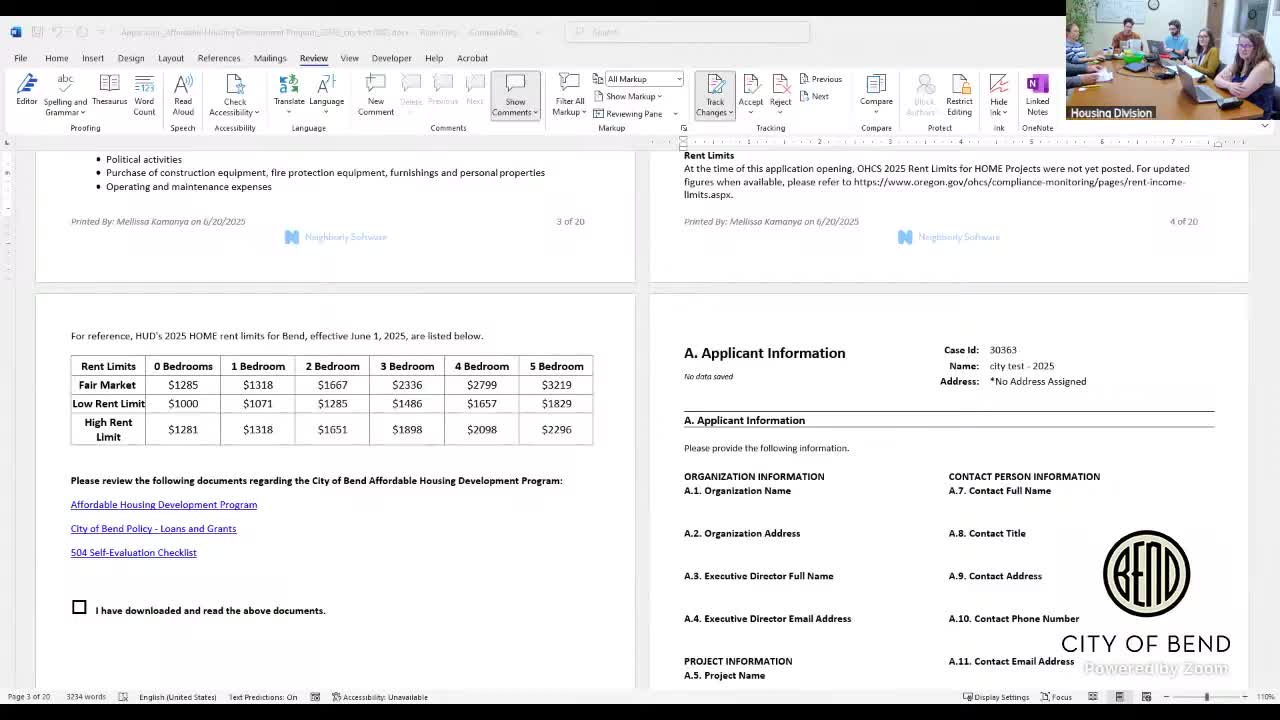Panel Discusses Criteria for Evaluating Project Applications and Key Personnel Roles
September 30, 2025 | Bend, Deschutes County, Oregon
This article was created by AI summarizing key points discussed. AI makes mistakes, so for full details and context, please refer to the video of the full meeting. Please report any errors so we can fix them. Report an error »

In a recent meeting of the Affordable Housing Advisory Committee's Application Review Subgroup in Bend, Oregon, members engaged in a detailed discussion about the application process for affordable housing projects. The focus was on refining the information required from organizations applying for funding, aiming to streamline the review process and enhance clarity.
One of the primary topics was the necessity of including key organizational details, such as the executive director's name and the board president's name, along with project specifics. Members expressed a desire for concise information, suggesting a maximum word limit of 2,000 words for organizational background, while recommending a more manageable target of around 500 words. This change aims to reduce redundancy, especially since many organizations frequently apply for funding.
The subgroup also discussed the financial information required from applicants. There was a consensus that some questions were duplicative, particularly regarding the organization's financial stability and funding sources. Suggestions were made to relocate certain questions to the finance section of the application to avoid confusion and ensure that reviewers could easily assess an organization's financial capability to complete the proposed project.
Another significant point of discussion was the importance of understanding the qualifications of key personnel involved in projects. Members highlighted the need for clarity on who is responsible for various tasks and the qualifications of those individuals. This information is crucial for assessing whether the organization has the necessary expertise to successfully execute the project.
The conversation also touched on the relevance of staff experience, particularly in organizations with new personnel. While some members indicated that a lack of experience could raise concerns, others emphasized the importance of the organization's overall history and past performance in affordable housing initiatives.
As the meeting concluded, the subgroup recognized the need for standardization in how information is presented in applications. Suggestions included requiring specific key personnel to be named and establishing clearer guidelines for what constitutes adequate involvement in a project.
Overall, the discussions highlighted the committee's commitment to improving the application process for affordable housing projects in Bend. By refining the information required from applicants and ensuring that reviewers have the necessary tools to evaluate proposals effectively, the committee aims to enhance the impact of funding on the community's housing needs. The next steps will involve implementing these recommendations and continuing to assess the application process for further improvements.
One of the primary topics was the necessity of including key organizational details, such as the executive director's name and the board president's name, along with project specifics. Members expressed a desire for concise information, suggesting a maximum word limit of 2,000 words for organizational background, while recommending a more manageable target of around 500 words. This change aims to reduce redundancy, especially since many organizations frequently apply for funding.
The subgroup also discussed the financial information required from applicants. There was a consensus that some questions were duplicative, particularly regarding the organization's financial stability and funding sources. Suggestions were made to relocate certain questions to the finance section of the application to avoid confusion and ensure that reviewers could easily assess an organization's financial capability to complete the proposed project.
Another significant point of discussion was the importance of understanding the qualifications of key personnel involved in projects. Members highlighted the need for clarity on who is responsible for various tasks and the qualifications of those individuals. This information is crucial for assessing whether the organization has the necessary expertise to successfully execute the project.
The conversation also touched on the relevance of staff experience, particularly in organizations with new personnel. While some members indicated that a lack of experience could raise concerns, others emphasized the importance of the organization's overall history and past performance in affordable housing initiatives.
As the meeting concluded, the subgroup recognized the need for standardization in how information is presented in applications. Suggestions included requiring specific key personnel to be named and establishing clearer guidelines for what constitutes adequate involvement in a project.
Overall, the discussions highlighted the committee's commitment to improving the application process for affordable housing projects in Bend. By refining the information required from applicants and ensuring that reviewers have the necessary tools to evaluate proposals effectively, the committee aims to enhance the impact of funding on the community's housing needs. The next steps will involve implementing these recommendations and continuing to assess the application process for further improvements.
View full meeting
This article is based on a recent meeting—watch the full video and explore the complete transcript for deeper insights into the discussion.
View full meeting
